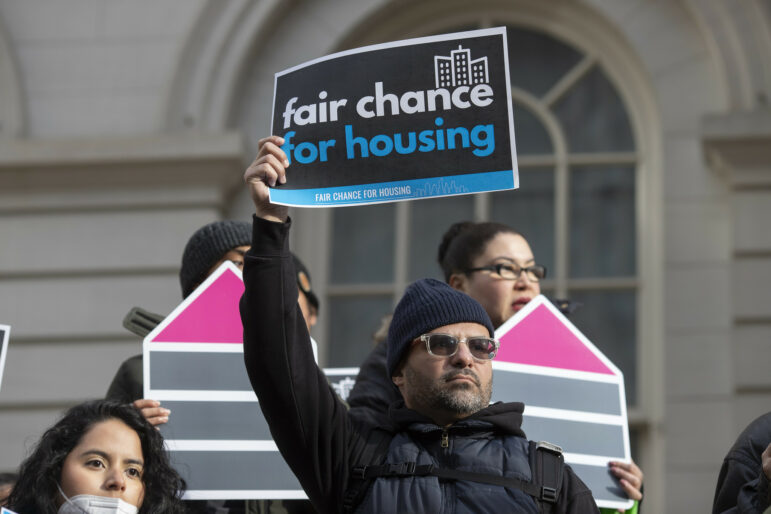The Fair Chance for Housing Act, passed by the City Council Wednesday, will limit the extent to which landlords, real estate brokers and other entities can factor in past convictions when considering a housing applicant—though the final bill is less expansive in banning the use of background checks than a version debated last year.

John McCarten/NYC Council Media Unit
A man holds a sign at a December 2022 rally in support of the Fair Chance for Housing bill.
Finding an apartment can be grueling for any New Yorker. For the approximately 750,000 residents in the city with a criminal conviction in their past, it’s even harder.
The City Council on Wednesday passed legislation aimed at addressing that hurdle: The Fair Chance for Housing Act, approved by a vote of 39 to eight, will limit the extent to which landlords, real estate brokers and other entities can factor in past convictions when considering a housing applicant.
“As we’ve had this conversation continuously about the need to build more housing and protect folks from displacement…we also have to really focus on making it easier for people to get into the housing,” the bill’s sponsor, Councilmember Keith Powers, told City Limits ahead of the vote. “Particularly this group that we’re talking about—folks in many cases who are trying to rehabilitate their life.”
Similar efforts have been introduced in the Council in previous years, but were met with push back. The bill approved Wednesday is less expansive than the original version debated last year, which would have allowed inquiries into the sex offender registry but otherwise banned the use of criminal background checks “at any stage” in the screening process, though it included an exemption for two-family owner-occupied homes.
Those exemptions are maintained in the revised version of the legislation. It now also allows for landlords, brokers and sellers to consider an applicant’s recent criminal justice involvement: misdemeanors within the last three years, and felony convictions within the last five. The look-back window would capture either the time of release from jail or prison, or the time of an individual’s sentencing if they weren’t incarcerated.
Powers said the changes were the result of lengthy negotiations with stakeholders on both sides, and is similar to legislation like the Clean Slate Act recently passed in Albany, which seals certain convictions after a set number of years.
“A built-in time period where individuals can demonstrate to folks that they have put this into their past, that they have not created a new criminal history record for themselves,” the lawmaker said. “We know that if they get that access [to housing] they’re even more unlikely to re-offend.”
Supporters of the legislation say it’s also a racial justice issue: 80 percent of the New Yorkers with a conviction on their record are Black or Latino, a disparity fueled by biases embedded in the criminal justice system, according to the Fair Chance for Housing Coalition, which has been pushing for the bill’s passage. Criminal background reports can also contain errors, supporters note.
“There’s no evidence or research that suggests that someone with a conviction history will be a dangerous tenant in some way,” said Andre Ward of The Fortune Society, a coalition member and nonprofit that provides housing for formerly incarcerated New Yorkers.
“The bill doesn’t necessarily get exactly to where we want it to be,” he said of the look-back windows added to the revised legislation. “But we settled for where we are now. And I’m grateful for all the stakeholders who were involved in it, even those who may have been adversarial to some degree.”
Several real estate groups had raised concerns with the original version. “No bill should permit contact with the criminal justice system, by itself, to be a valid reason to deny housing,” the Community Housing Improvement Program, which represents landlords of rent-stabilized housing in the city, testified at a Council hearing last December. “But we also believe that completely ignoring recent convictions for violent or harmful conduct is irresponsible to existing tenants.”
The group’s executive director Jay Martin told City Limits Wednesday that the new version “got this bill to a place [where] we think it works for both sides.”
He pointed to a provision in the revised bill which mandates landlords and brokers consider all other qualification criteria, like an applicant’s employment and credit history, before factoring in a criminal record.
The legislation also requires that applicants be notified before a background check if one is conducted, and if they’re rejected for a past conviction, the landlord must give them a chance to correct errors in the report as well as “provide a written explanation to the applicant of how the reviewable criminal history affected a legitimate business interest.”
“It gets at where they want to go, which is eliminating some of this upfront discrimination just by looking at someone’s record,” Martin said. “This bill helps make sure that property owners are looking at the economics first and foremost, which is what they should be doing.”
Still, others said they were disappointed to learn of the changes from the earlier version, saying the three- and five-year windows in which past convictions can still be considered makes it harder for those just coming out of incarceration to stabilize their lives.
“Everybody deserves a place to live,” said Rex Duval, a pastor with the organization Prison in the Wild, which runs programs for incarcerated and formerly incarcerated New Yorkers and supported the original legislation last year. “We start creating more obstacles, then it just becomes impossible—and then we wonder why we have two and a half million people in our correctional system, and why recidivism is so high.”
To reach the reporter behind this story, Jeanmarie@citylimits.org








